When it comes to the “on and off” Narc Kenya grassroots elections who for heavens sake is the official voice of this party? Is it the Deputy Party Leader, or the National Chairman, or is it one of the eight Vice Chairmen or the Secretary General or the Organizing Secretary?
I am compelled to raise this question because it must have surprised many when the chairman Raphael Tuju would have the Party Whip Jayne Kihara send short text message (SMS) to all the party MPs informing them that the party has postponed the elections indefinitely because of the national prayers on May 26, the day the elections are suppose to start.
In the recently announced party national leadership line-up, the Naivasha MP’s position as the Party Whip perhaps two tiers below the positions mentioned above. Party Whip position’s jurisdiction relates to party parliamentary matters and not party management and or election affairs.
In what was termed by the media as a hurriedly Press Conference Dr Mukhisa Kituyi, the party Secretary General quickly and rightly noted: ‘‘She cannot speak on behalf of the party. We decided that grassroots elections kick off on May 25.” One of the Party’s Vice Chairman George Saitoti, at the same press conference, pointed out: ‘‘I am here to reaffirm the decision taken by the party that the grassroots elections go on as planned. They cannot be cancelled if we are a serious political party.” And not to be out done the Organizing Secretary Danson Mungatana added: ‘‘Kihara and the group scared of elections need prayers. They should go for the prayer breakfast and later go for elections.’’
It has since emerged that the party National Chairman Tuju did indeed communicated with Kihara with regards to the party election. The Foreign Affairs minister confirmed that he had communicated to Kihara about the elections timetable interruption but he was quick to point out that this would only be done when necessary. Why Tuju saw the need to communicate to the members through a junior official instead of say the Secretary General or the Organizing Secretary or their deputies (each has three) raises more questions than answers.
The party’s grassroots election has been the bone of contention in this party. There are two competing groups, one for and the other against the holding of elections.
Tuju can refuse to accept the fact that there is a major crisis and looking to blame the opponents does not hold water. Narc Kenya opponents, ODM Kenya, has nothing to do with Tuju’s miscommunications. Tuju can allayed fears of a divided party saying in any democracy people were likely to discuss issues openly and loudly but the fact remains that there are signs that the party is divided.
I boldly ask this question: Is this party a serious political party or is it just an arrangement established by the head of state’s supporters as President Mwai Kibaki’s re-election outfit and a vehicle for them (current legislators who formed the party) to seek to recapture their parliamentary seats in tandem. The current MPs allied to the party are genuinely accused by civic and parliamentary aspirants of locking them out of leadership. To a large extent there is some validity in this accusation.
Many would agree with Kiraitu Murungi, a party Vice Chairman when he pointed out that Narc Kenya ought to go on with the elections so that it could move from “being a large sheltering roof without foundations and pillars to support it”.
Kenyans’ memories as to what happened when Narc went to the general election without holding party elections are very . The party did not establish “party structures” and there was no elections held since inception, notwithstanding the fact that it has been the country’s a ruling party for more than four years. Is Narc Kenya dejavu all over again for its supporters who were moved from ‘Mama Narc’? We can only wait and see.
***
Winners, losersin Magarini poll
The dust has now settled in Magarini constituency after the bitterly contested by-election. In analyzing the winners and losers in this by-election the outcome is very obvious. Although many would not want to give them credit to the winners, but apart from the MP-elect Harrison Kombe himself, the true winners of this by-election are the three Coast based Ministers allied to NARC Kenya who decided to support the immediate former MP to recapture his seat through his original Shirikisho Party instead of fielding their party candidate. Kombe voted with the Government in Parliament and as such there was no need to oppose someone who is already with you in the first place.
Led by the Transport Minister Chirau Mwakwere, Morris Dzoro and Suleman Shakombo, Tourism and Wildlife and National Heritage respectively, should be credited for uniting in making sure they came out victorious. This show of unity has been missing in the province. The youthful and far-sighted Immigration and Registrations of Persons Assistant Minister Anania Mwaboza joined the trio to support Kombe.
Had Harrison Kombe lost this election, there would have been several commentaries to the effect that the three Ministers do not hold any sway in their own backyard. But now all those commentaries will not see sunlight, they have been discarded. As they say, charity begins at home; Mwakwere as a Mijikenda spokesperson and elder has shown his finesse and has emerged as a true leader of the province by starting to put his mark in the greater Mijikenda-lands.
The losers of this by-election include the first tier group of the four serious vote getting candidates namely Jeffah Kingi, Franco Esposito, Samuel Nzai and David Noti Kombe. The second tier losers is ODM-K as a party and all the party’s big-wigs who camped in the constituency and erroneously thought they have political relevance in the area.
Another side loser in this election is Danson Mungatana, who despite his greenish political experience believes he should be taken seriously in the province as a political leader. As a legal mind one would have thought the Justice and Constitutional Affairs Minister could come out as clever politician but every passing day the Garsen MP is proving to be a naïve legislator who refuses to learn from his elders.
I would boldly like to remind the youth Garsen legislator that by being covered by the Press and other media outlets every passing day does not make one a political leader to be reckon with.
***
Why not try directmayoral elections?
The revocation of the former Mombasa Mayor Taib Ali Taib’s appointment as a ‘nominated councillor’ forced him to lose his mayoral position. The revocation, constitutional or otherwise was made by the Local Government Minister Musikari Kombo. This circus that landed in the hands of the constitutional court that decided in favour of the former Mayor ought to compel the current Parliament to enact the much awaited law on direct election of mayors in our cities and towns.
There had been talks that the Local Government Act as we know it will be changed to give the voters in Nairobi and all other major towns the powers to directly elect their mayors. A mayor who is elected by a few individuals is susceptible to blackmail and because of the fact that the mayors have to seek "re-election" in mid-term makes their tenures unproductive and strenuous. But in cases where the mayors would be answerable to the voters it would make their four-year five term tenures secured thereby enabling them to concentrate in their service delivery by improving and developing their municipalities.
The residents of the City of Nairobi and all major towns and municipalities such as Mombasa, Kisumu, Nakuru, Garissa, Eldoret, Kakamega, Malindi, Kisii, Embu, Nyeri should be empowered to elect their respective mayors. Eventually all the Chairpersons of the local authorities should be directly elected by the people. This is not asking for too much.
We need to avoid such situations as the one in Mombasa where for instance we have had two ‘Nominated Councillors’ on separate occasions ending up being elected mayors of the country’s second largest metropolis. Najib Balala (now Mvita MP) and Taib were never elected at grassroots level as councillors but were elected Mayors of Mombasa. It might have escaped people’s minds but such type of mayors are technically answerable to the political parties that nominated them, god fathers and to the councillors who helped put them to the mayors’ parlour. On the face of it these individuals surely don’t see themselves answerable to the people—they never elected them.
While Balala who served for only six months became very popular, Taib on the other hand was arrogant and egotistical such that instead of him being the servant of the people, he wanted people to behave as his servants’ or something like that.
The facts remains that direct election of the mayors will go a long way in having the people give consent as to who should run their local governments and or who become their mayors. The matter should not be left to the few councillors who because of their low remuneration are susceptible to be corrupted to sell their votes to the highest bidder. We see this vote buying every time there is competitive mayoral race in the country’s municipalities. It makes sense that the individuals who run their respective municipalities should have the direct mandate from the people to do so, the same way MPs get theirs from their respective constituents.
These are some of the changes that Kenyans expect from the lawmakers and not seeing them devoting their time in strategizing how they will distribute political powers once elected to the office. The self-centred legislators are only concerned with filling their stomachs.
omarahmedali@gmail.com
skip to main |
skip to sidebar


President Mwai Kibaki meets with Prime Minister Designate Raila Odinga in a jovial mood after a sucessful round of talks at his Harambee house office, Nairobi.

President Mwai Kibaki meets with US Secretary of State Dr. Condoleezza Rice at his Harambee House office where they held talks.

Displaced persons in Naivasha leave for their ancestral homes.

Dr Abdillahi Alawy, Faraj Dumila and Omar Ahmed Ali. Dumila is the world renowned Swahili author, columinst, and biographer

Kibaki and Ban Ki Moon

Pres. Mwai Kibaki wlecomes UN Secy. Gen Mr. Ban Ki-Moon at State House, Nairobi
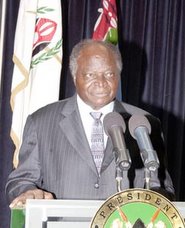
President Mwai Kibaki consoles the families of the bereaved and their Nations following the Kenya Airways plane crash in Douala, Cameroon during a television and radio address at State House, Nairobi.

"We are everything political"

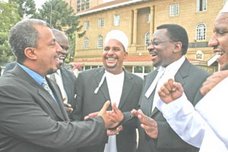
After plowing through the most boring years of the Sharrif Shekue's tenure, Mombasa is seeing the return of its displaced mayor.
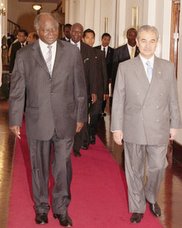
President Mwai Kibaki with the visiting Prime Minister of Malaysia, H.E Hon. Abdullah Ahmad Badawi at State House, Nairobi.

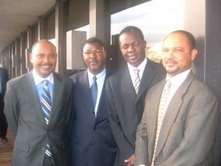
Omar Ali, Moses Watengula, Raphael Tuju, and Dr. A. S. Alawy in Washington DC
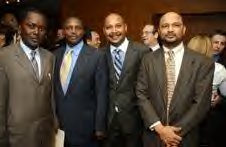
John Maina (Embakasi parliamentary aspirant) and Ambassador Leornard Ngaithe, Omar Ali and Dr. A.S. Alawy
FAIR USE NOTICE: This site may contain copyrighted material whose use has not been specifically authorized by the copyright owner. Kenyapolitico is making these articles available in our efforts to advance the fast changing politics of Kenya and the world with regard to human rights, social and political issues. We believe that this constitutes a 'fair use' of the copyrighted material as provided for in section 107 of the U.S. Copyright Law.
Bendera

Nairobi, April 2008

President Mwai Kibaki meets with Prime Minister Designate Raila Odinga in a jovial mood after a sucessful round of talks at his Harambee house office, Nairobi.
Harambee House, Nairobi, 2008

President Mwai Kibaki meets with US Secretary of State Dr. Condoleezza Rice at his Harambee House office where they held talks.
Picture of the week, sad that is

Displaced persons in Naivasha leave for their ancestral homes.
Stavrose Restaurant- Mombasa Kenya-2007

Dr Abdillahi Alawy, Faraj Dumila and Omar Ahmed Ali. Dumila is the world renowned Swahili author, columinst, and biographer
Nairobi 2008

Kibaki and Ban Ki Moon
The Mediation efforts

Pres. Mwai Kibaki wlecomes UN Secy. Gen Mr. Ban Ki-Moon at State House, Nairobi
May 14, a day of Mourning, for Flight KQ 507

President Mwai Kibaki consoles the families of the bereaved and their Nations following the Kenya Airways plane crash in Douala, Cameroon during a television and radio address at State House, Nairobi.
Kenya Politico

"We are everything political"
bendera

Taib win his Case against Kombo

After plowing through the most boring years of the Sharrif Shekue's tenure, Mombasa is seeing the return of its displaced mayor.
Malaysia PM visit

President Mwai Kibaki with the visiting Prime Minister of Malaysia, H.E Hon. Abdullah Ahmad Badawi at State House, Nairobi.
africa yetu

At an Obama Function at the Library of Congress

Omar Ali, Moses Watengula, Raphael Tuju, and Dr. A. S. Alawy in Washington DC
At the Library of the Congress continues

John Maina (Embakasi parliamentary aspirant) and Ambassador Leornard Ngaithe, Omar Ali and Dr. A.S. Alawy
Blog Archive
-
▼
2007
(77)
-
▼
May
(14)
- Sen. Barrack Obama akiwa nyumbani kwao Kenya. Pho...
- The Tower of Babel that is Narc-Kenya
- The big duel that never was
- Confusion Over Coast Varsity
- Our hearts go out to those victims of KQ plane crash
- You've done well, Mr President
- Urasimu katika utoaji habari uachwe
- KQ Urged to Continue West African Route
- Obama: U.S. must help automakers shift to greener ...
- Having tough time!
- Why are Coast leaders so silent on the Guraya terror?
- Mwakwere to lead team of investigators to Cameroon
- Kenya Airways plane with 114 Aboard Crashes in Cam...
- Obama proving critics wrong
-
▼
May
(14)